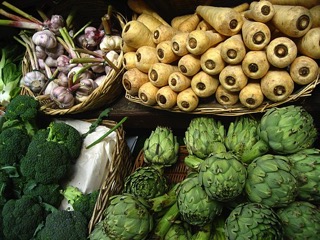
You can eat fermented foods every day and take all the probiotic supplements you want, but if you aren’t also feeding those intestinal bacteria what they want, you could be throwing your money away. That’s because to thrive and multiply, healthy gut bacteria need to eat. And what your gut bacteria like best is fiber.
Recently published research done at the University of Oveido in Spain found that obese people with low levels of a group of intestinal bacteria — Bacteroides, Prevotella, and Porphyromonas — also had a lower intake of fruit.
Fruit is a good source of pectin, which is metabolized in the colon by bacteria, such as Bacteroides, producing small chain fatty acids (SCFAs). SCFAs are known to keep the immune system in check and turn down inflammation, known to be implicated in obesity.
The researchers conclude in the journal Nutrients, “These results could be useful for designing strategies targeted to obesity prevention.”
Why Feed Your Microbiome Prebiotics
Researchers have yet to agree on a precise definition of prebiotics, the substances that intestinal bacteria feed on, but generally the scientists agree that these are “undigested dietary carbohydrates that are fermented by colonic bacteria yielding short chain fatty acids.”
Different prebiotics may nourish different types of bacteria, and researchers have not yet pinned down the specifics — that is, exactly what prebiotic nourishes which bacteria. But you can’t go wrong covering your bases by eating with a wide variety of fruits and vegetables.
A high fiber diet has often been recommended for people who need to lose weight, but now we know the point of eating more fiber is not only to make you feel full, but also because of its integral role in sustaining a healthy diversity of gut bacteria. Meanwhile, the opposite — an unhealthy microbiota — is being increasingly associated with inflammation and obesity.
Supporting gut bacteria with probiotics
In addition to a diet of ample and diverse produce that is rich in prebiotic fiber, you can also support your microbiota with probiotics. Probiotics work best when you are already fostering your gut environment with healthy prebiotic fiber. Look for probiotics that will survive the acidic environment of the environment. Many different strains exist and researchers are increasingly finding different strains support different aspects of health. Research which ones may be best for you and switch them up on occasion.
Fermented foods such as kimchee, sauerkraut, kefir, and kombucha contain live microbes that can help improve the health of your gut bacteria. Make sure you get truly live products and not pasteurized. They will usually be in the refrigerated section at the store.
Ask my office for more advice on building good gut health.



Latest from the Blog
The Dirty Dozen
August 19, 2024The “Dirty Dozen” is a list of fruits and vegetables, compiled by the Environmental Working Group (EWG), that you should always eat organically. These produce items are not only delicious and nutrient-rich but also tend to carry high levels of pesticide residues when grown conventionally. By opting for organic versions, you can significantly reduce your […] Read more
Latest from the Blog
3-Day Detox Plan
Here’s a 3-day detox meal plan tailored to be autoimmune-friendly and compliant with functional medicine principles. This plan emphasizes anti-inflammatory, nutrient-dense foods while avoiding common triggers for autoimmune symptoms. Day 1 Breakfast: Green Smoothie Bowl Ingredients: Spinach, kale, cucumber, green apple, avocado, coconut milk, chia seeds. Why: Spinach and kale are rich in vitamins A, […] Read more